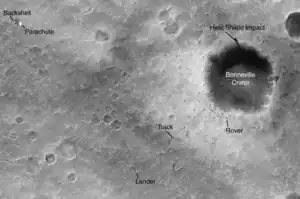 Overhead view from Mars Global Surveyor on 20 December 2004 with the Spirit rover, its lander, parachute, heatshield impact, backshell and the rover tracks | |
| Planet | Mars |
|---|---|
| Region | Gusev crater |
| Coordinates | 14°36′S 175°30′E / 14.6°S 175.5°E |
| Quadrangle | Aeolis |
| Diameter | 210 m |
| Depth | 14 m |
| Discoverer | Spirit rover |
| Eponym | Lake Bonneville |

Bonneville is an impact crater on Mars. It is located within the much larger crater Gusev. Bonneville was visited by the Mars Exploration Rover Spirit in 2004, during its exploration of the floor of Gusev. Bonneville is also the final resting place of Spirit's heat shield, jettisoned during the landing procedure; the heat-shield could be seen glinting on the opposite wall when Spirit photographed the crater. The crater is 210 metres in diameter, 14 meters deep and its rim rises 6.4 metres above the surrounding terrain.[1]
Bonneville is named after Benjamin Bonneville and Lake Bonneville, an ancient lake in Utah.
Formation and geology
The strata into which Bonneville formed is thought to be loose debris, although some of the ejecta may have originated from more competent rocks. No underlying bedrock was exposed in the crater or the numerous craterlets in Bonneville's walls. The crater is relatively pristine and in particular has not been affected by water based erosion.[1][2]
It is likely that Bonneville is a secondary crater, given its low depth to diameter ratio.[1]
References
- 1 2 3 Squyres; et al. (2004). "Surficial Deposits at Gusev Crater Along Spirit Rover Traverses". Science. 305 (5685): 807–810. Bibcode:2004Sci...305..807G. doi:10.1126/science.1099849. PMID 15297659. S2CID 16210973.
{{cite journal}}: CS1 maint: numeric names: authors list (link) - ↑ Golombek; et al. "Surfical geology of the Spirit rover traverse in Gusev Crater: dry and desiccating since the Hesperian" (PDF). Retrieved 2008-04-24.
External links
- Official Mars Rovers site
- NASA Astronomy Picture of the Day: Spirit Pan from Bonneville Crater's Edge (18 March 2004)
.jpg.webp)